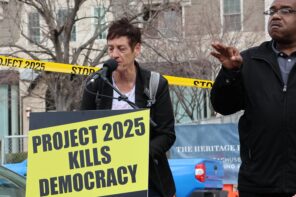Texas pastor Robert Jeffress, who became a media sensation earlier this month for his blunt remarks about Mitt Romney’s Mormonism, published an opinion piece in the Washington Post this week accusing his critics of trying to “marginalize religion” and make a candidate’s religious beliefs “off limits” in political discussion. But being criticized is not the same as being silenced. Jeffress mixes and muddles several issues in his mea non culpa; it’s worth sorting out where he’s right and wrong.
Jeffress is correct that it is legally permissible to talk about a candidate’s faith. The Constitution’s prohibition on a religious test for public office prevents the government from requiring office-seekers to pledge adherence to any religious creed. It doesn’t prevent candidates from talking about how their faith influences their thinking on an issue. And it doesn’t prevent people like Jeffress from saying that he thinks Christians should only vote for other Christians.
But if Jeffress wants to defend a freewheeling examination of candidate’s spiritual beliefs, he can’t accuse those who disagree with him of engaging in “intimidation.” The same First Amendment that protects his right to call Mormonism a “cult” in the context of endorsing Rick Perry—and to say that Catholicism is a creation of Satan, that Jews can’t achieve salvation, and that Islam springs from the “pit of hell”—also protects others’ rights to criticize him for doing so.
Furthermore, it is perfectly possible to be an ardent defender of free speech and to believe that it is not good for our country to have political campaigns revolve around which candidate’s faith is more sincere, or for policy debates to turn into battles over competing interpretations of scripture. I will be the first to acknowledge that there is plenty of room for honest disagreement about where to draw the lines between what does and does not violate the spirit of the Constitution; what is and is not the appropriate way to mix religion and politics in a pluralistic society. Here’s where I come down on some of those issues.
It is not good for our civic discourse to disparage a candidate’s religion. Suggesting that people of minority faiths are unworthy to serve in public office—or less worthy than a “committed Christian”—is divisive, and violates the spirit of the Constitution. In our country, anyone’s standing as a citizen, or a candidate, should not depend on holding the “right” religious beliefs.
In the same category we shouldn’t be questioning whether a candidate’s religious beliefs are “genuine” or “sincere” based on political disagreements. People who consider themselves Christians hold a wide range of beliefs on any political topic. It is wrong for pundits and politicians to declare that a candidate is not a “real” Christian because he or she disagrees with them on women’s access to abortion, legal equality for LGBT people, or tax policy.
Jeffress thinks it’s fine to interrogate candidates’ religious beliefs. “The question is not whether personal spiritual beliefs shape a politician’s values and policies, but what spiritual beliefs mold those values and policies.” Indeed there may be times when it is legitimate to ask whether a candidate’s religious positions would have a direct impact on policy. Religious Right activist David Barton has declared that the Bible is opposed to progressive taxation, capital gains taxes, collective bargaining, and the minimum wage. It’s legitimate to ask whether candidates who praise Barton’s work—such as Michele Bachmann and Newt Gingrich—share those opinions. Similarly, when a presidential candidate like Bachmann calls a Christian Reconstructionist thinker her “mentor” and declares that he has had a significant impact on her thinking, it is not religious bigotry to ask whether she shares his views about the Constitution and the roles of religion and government in society. But questioning the authenticity or soundness of a candidate’s religious views, for example to have Barton and Glenn Beck rail against what they believe are President Obama’s religious views on the nature of salvation, seems far less appropriate—or useful.
Mitt Romney, the target of Jeffress’ attacks, is admittedly in a difficult position (as Sarah Posner has noted) because he is running for the nomination of a political party that has supported the Religious Right’s attacks on church-state separation and embraced the false idea that the country was created of, by, and for a certain kind of Christians:
Romney was out front defending his own candidacy from the imposition of a religious test. But he appears unwilling to confront his party’s mythologizing of a Christian nation and degradation of the separation of church and state.
Jeffress writes in the Post, “I predict secularists are going to be continually frustrated over the next 13 months as religion continues to be a part of the national political debate. America is filled with religious people, and to religious people, religion matters.”
Here again, I believe Jeffress is both right and wrong. Religion does matter to religious people. But so does religious liberty. So does respectful pluralism. It may well be that people of faith are at least as frustrated as secularists by the unwise and unpleasant ways that people like Jeffress are using faith in this political season.




